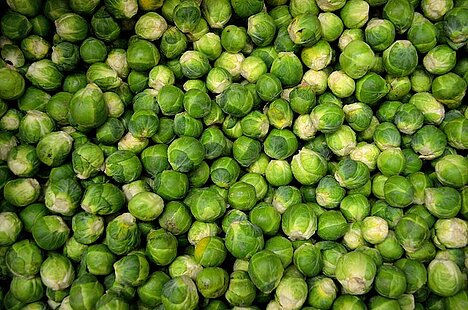Brussels sprouts

What are Brussels sprouts?
Brussels sprouts are a type of cabbage consisting of many small green florets that grow on a stalk. It belongs to the cruciferous family, which also includes broccoli, cauliflower and kohlrabi. Brussels sprouts have a mild and slightly nutty flavor. They are usually eaten boiled or steamed, but can also be eaten raw.
What are the benefits of Brussels sprouts for dogs?
Brussels sprouts are rich in vitamins, minerals and antioxidants that are important for your dog's health. For example, they contain vitamin C, which strengthens the immune system, vitamin K, which promotes blood clotting, and folic acid, which is important for cell division. Brussels sprouts also provide fiber, which aids digestion and increases the feeling of satiety.
Brussels sprouts also have anti-inflammatory and antibacterial properties that can protect against infections. They also contain a substance called sulforaphane, which can protect against cancer by inhibiting the growth of tumor cells.
What are the disadvantages of Brussels sprouts for dogs?
Brussels sprouts also have some disadvantages for dogs that you should be aware of. Firstly, Brussels sprouts can cause bloating in some dogs as they contain sugar compounds and fibers that are difficult to digest. These are broken down by bacteria in the intestine, resulting in gas. This can lead to discomfort and abdominal pain.
On the other hand, Brussels sprouts can be counterproductive for dogs with thyroid problems as they contain so-called goitrogens. These are substances that can inhibit the absorption of iodine. Iodine is an important component of thyroid hormones. If your dog gets too little iodine, it can develop hypothyroidism.
How do I prepare Brussels sprouts for my dog?
If you want to give your dog Brussels sprouts, it is best to boil or steam them. This makes them softer and easier to digest. It also breaks down some of the flatulent sugar compounds. Avoid spices such as salt, onions or garlic, as these can be harmful to dogs.
Start with small amounts and observe how your dog reacts to them. If he doesn't show any digestive problems, you can occasionally give him a little more. A rule of thumb is that vegetables should not make up more than 10 percent of your dog's daily calorie intake.
Brussels sprouts can be a healthy addition to your dog's diet as long as you feed them in moderation and make sure they are prepared correctly. They contain many nutrients that can promote your dog's well-being. However, it can also cause bloating or thyroid problems if fed in excessive quantities or raw. You should therefore always be careful and keep a close eye on your dog.
Properties 4
Are you looking for other ingredients with a specific property?
Just click on them to find more.
If you notice any signs of hypersensitivity or poisoning in your dog, you should see your vet immediately. We are not a substitute for a vet, but we try to be as accurate as possible. Every dog reacts differently and we recommend you get a second opinion or consult your vet if in doubt.
Stay healthy and take good care of your four-legged friend!😊